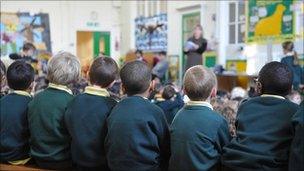Gove plan to ease expansion for popular schools
- Published

Parents often face a struggle to secure a place for children at popular schools
Education Secretary Michael Gove wants changes to the admissions code to make it easier for popular schools in England to expand.
Ministers are considering ending requirements that schools gain local-authority permission to enlarge and hold a public consultation if they want to add more than 27 pupils a year.
Mr Gove said this would put pressure on underperforming schools to improve.
But head teachers warned they should not be allowed to "wither on the vine".
Schools are funded according to the number of pupils they have.
Mr Gove told the Guardian newspaper he wanted to "remove bureaucracy" affecting expansion as part of planned changes to the admissions code.
The government is currently preparing a "slimmed down" version of the document, which sets out the rules for fair admissions in England.
'Full up'
Currently, every school is set a "planned admissions number", but ministers say the process for trying to expand beyond it is too complex.
Mr Gove said: "We hope the new admissions code allows the possibility of increasing planned admissions numbers so good schools can expand, and there will be underperforming schools that have fewer and fewer numbers. That will compel their leadership and the local authority to ask what is wrong.
"It's wrong to have a situation where the local authority says, 'This is a good school, it's full up, parents have to go to the less good school down the road.' Because as a result of the local authority's failure to deal with educational underperformance, children continue to go to a poor school."
The government has said it intends to offer support for underperforming schools, but has threatened to use powers to force them to become academies if they do not produce effective improvement plans.
'Declining resources'
Russell Hobby, general secretary of the National Association of Head Teachers, said: "There is no problem with good schools expanding, but school places must be carefully planned across an area or we risk damaging education in every other school."
"'Withering on the vine' might work in the private sector but it is not an acceptable outcome for children... Struggling schools need rapid help to turn around, not a long drawn-out death of declining resources and numbers, condemning the remaining pupils to lower standards," he added.
The government is expected to publish a draft version of the updated admissions code later this year.
It says the document should be simplified, although some teaching unions have said they fear this could have the effect of watering it down.
Chris Keates, General Secretary of the NASUWT teaching union, accused the Education Secretary of "showing disregard for parliamentary process" by failing to publish the draft admissions code alongside the Education Bill, which has been debated in the House of Commons in recent weeks.
"Why is it taking so long to be publish the Admissions Code - what has he got to hide?," she asked.
Both the Conservatives and the Labour government that preceded the coalition have said they want to make it easier for popular schools to expand.
Labour created a fund to which oversubscribed schools could apply to help increase capacity.
One in seven pupils failed to get a place at their first choice of secondary school this year.
There are also concerns about a shortage of primary school places in the next few years in some areas, with London predicting a shortfall of about 70,000 over the next four years.
- Published18 May 2011
- Published22 April 2011
- Published17 March 2011
- Published16 April 2011
- Published24 November 2010